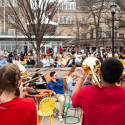University names residence hall after civil rights pioneer
A University of Wisconsin–Madison residence hall will be named for Wisconsin civil rights pioneer Vel Phillips, according to University Housing officials.
The newly named Phillips Hall is one of only a relatively small number of buildings named in honor of women on campus and is only the second building on campus named after a person of color, with the other being Carson Gulley, also a University Housing building used daily by undergraduate students and others.
Phillips graduated with a law degree from UW–Madison in 1951, becoming the first African-American woman to graduate from the UW Law School. This began a series of many firsts for Phillips, which became her trademark.
She was the first African-American and the first woman elected to Milwaukee’s Common Council in 1956, where she served until 1971, when she was appointed by Gov. Patrick J. Lucey to the Milwaukee County judiciary, becoming the first woman judge in Milwaukee County and the first African-American judge in Wisconsin.
In 1978, Phillips made national history as the first woman and first African-American elected to a statewide office, Wisconsin’s secretary of state.
Keeping true to the university’s tradition of naming floors or “houses” of residence halls after accomplished people associated with the university, the floors in Phillips Hall will be named to honor famous women of the university.
Honorees include Kay Clarenbach, founder and first chair of the National Organization for Women (NOW) and one of the foremost leaders of the 20th century women’s movement in the United States; Gerda Lerner a founder of the field of women’s history, founding member of NOW and one of the creators of Women’s History Month; and Nellie McKay, a distinguished scholar and critic who helped secure a place for African-American women in the modern literary canon. Other spaces in the building honor Ruth Bleier, who was among the first American scholars to examine gender bias in the modern biological sciences from a feminist perspective, and Belle Case La Follette, a lawyer, journalist, editor, suffragist and counselor who provided much of the intellectual sophistication behind the Progressive movement for which her husband, Bob La Follette, was known.
Phillips Hall has been known as Friedrick Hall since 1976, when the building was run by UW-Extension as a conference center. When the building was converted to use as a residence hall in 2008, Extension officials wanted to continue to honor the Jacob F. Friedrick name in a building associated with their program.
This gave University Housing the opportunity to rename the residence hall, houses and lounge areas after women with ties to the university whose contributions offer inspiration to current and future generations.
Phillips and Lerner have both agreed to come to the residence hall this fall to spend time with undergraduate students who live in the facility and share their experiences with residents.
For more information and photos, visit http://www.housing.wisc.edu/phillips/bios.htm.
Tags: housing, milestones



